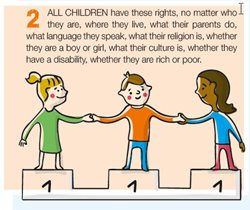Children’s rights and responsibilities
‘’It is an honor to be here with you today.’’ “You’re really going to
enjoy the time we spend together this evening. I’m going to share with you some
of the most important ideas.
Children of different age and gender have various interests and
needs. But despite the differences, they have equal rights. All of them have
the right to equal treatment. All children have equal rights.
In addition to rights, children also have responsibilities, like
adult members of the society. A child’s rights end where the rights of another
child or an adult begin. This means that rights have limits and a child must
consider the rights of other children and adults when exercising his/her
rights. Rights and responsibilities go hand in hand.

A child has the right to education, but at the same time his/her
duty is to attend school. A child has a right to health protection, but
he/she has an obligation take care of his/her health. A child has a right to
free speech, but by exercising one's right to free speech, the child must
respect the rights of other children and adults, above all the right to protect
one's honour and dignity.

The Convention on the Rights of the Child gives
the child the right to exercise his/her rights and bear obligations. This means
that as the child grows his/her right to decide himself/herself increases and
so does the scope of responsibility. Until a child is not able to execute
his/her rights, his/her parents or representatives will do it. The interests of
the child must always be the starting point.
As children cannot always protect their rights and interests,
they need help and protection from adults. Children have to be protected from
mental and physical violence, injustice, negligence, abuse, sexual abuse and
other threats. Additionally, adults must ensure that children have what they
need to live and establish suitable conditions for the development of
children's skills and interests.

The basis for a mutually respectful living environment is mutual
respect. Children must respect adults (parents, grandparents, kindergarten and
school teachers, etc.) and other children like adults must respect children and
other adults. Mutual respect and consideration of wishes is one of the
important premises of the society's coexistence.